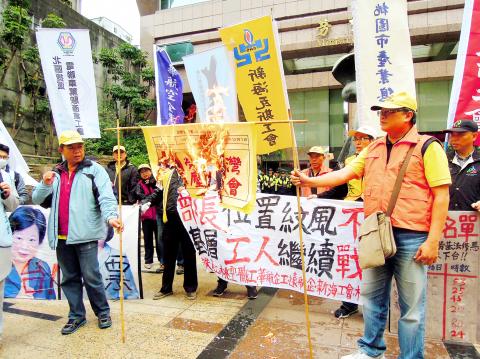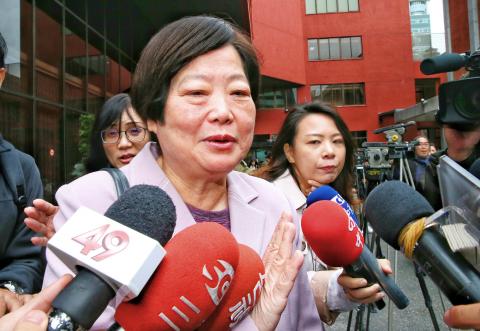Democratic Progressive Party (DPP) legislative caucus whip Ker Chien-ming (柯建銘) yesterday said that the Cabinet’s proposed amendment to the Labor Standards Act (勞動基本法) would undergo “subtle adjustments” next week.
Ker made the announcement following a meeting of the DPP caucus during which Minister of Labor Lin Mei-chu (林美珠) briefed DPP lawmakers on the adjustments.
The adjustments were proposed after Premier William Lai (賴清德) met with DPP lawmakers twice this week to hear their opinions and considered the public’s attitude toward the amendment, he said, adding that the adjustments will focus on several “regulatory measures” and would “tighten the rules” in the draft amendment.

Photo: CNA
Draft regulations that would allow employers to legally make employees work up to 12 days in a row before granting them two days off and that would reduce the minimum rest time between shifts from 11 to 8 hours will not be implemented at employers’ discretion, but after only local authorities meet with sector associations and determine which sectors have “special needs” that warrant such work schedules, Ker said.
Local authorities are to publish a list specifying sectors that qualify, which will then be double-checked by the labor ministry, Ker said.
That means requests to implement more flexible labor rules will not be reviewed on a case-by-case basis, but by sector, he said, adding that granting workers one day off every seven days and at least 11 hours of rest between shifts would remain the norm.

Photo: Chang Chia-ming, Taipei Times
Local governments are to announce which sectors are eligible for flexible schedules and individual employers in those sectors will then be allowed to start negotiations with unions or employeeswhose consent they first need to obtain, Ker said.
Employers are to specify under what circumstances and for how long they plan to implement flexible schedules, which are to be regularly reviewed by authorities and will be subject to change, he said.
Special circumstances under which the schedules could apply would include peak seasons, performance tours, large events and companies that are under pressure to fulfill orders within a limited time frame, Ker quoted Lin as saying.
One of the regulatory measures stipulates that, should any employers arbitrarily implement flexible schedules, employees could file complaints with local authorities, Ker said.
Asked if the caucus would clear the draft amendment through committee reviews next week, Ker said: “That is our hope.”
Separately yesterday, Lai said that the underlying principles of the draft amendment would remain unchanged, but called for the legal language to be drafted more precisely so that the public may understand the amendment better.
The draft amendment has gone through sufficient discussion and gained universal support among DPP members, he said, adding that it would grant employers and employees alike more flexibility, provided that labor rights are protected.
The premier on Thursday night on a political talk show rejected criticism that the amendment would “set labor rights back 100 years,” saying that the majority of workers will still have 12 hours of rest each day.
Total daily working hours will be capped at 12, he said, adding that it is “impossible” for a person to work for 16 hours and only rest for eight hours a day.
“In the worst-case scenario, workers will have at least 12 hours of rest,” Lai said, while conceding that some professions, such as nursing, might require special rules.
The biggest problem with the current “one fixed day off, one flexible rest day” policy is that it lacks flexibility, forcing 19 percent of workers to forgo opportunities to earn overtime pay and exposing them to increased competition from part-time workers and automated production lines, Lai said.

An essay competition jointly organized by a local writing society and a publisher affiliated with the Chinese Communist Party (CCP) might have contravened the Act Governing Relations Between the People of the Taiwan Area and the Mainland Area (臺灣地區與大陸地區人民關係條例), the Mainland Affairs Council (MAC) said on Thursday. “In this case, the partner organization is clearly an agency under the CCP’s Fujian Provincial Committee,” MAC Deputy Minister and spokesperson Liang Wen-chieh (梁文傑) said at a news briefing in Taipei. “It also involves bringing Taiwanese students to China with all-expenses-paid arrangements to attend award ceremonies and camps,” Liang said. Those two “characteristics” are typically sufficient

A magnitude 5.9 earthquake that struck about 33km off the coast of Hualien City was the "main shock" in a series of quakes in the area, with aftershocks expected over the next three days, the Central Weather Administration (CWA) said yesterday. Prior to the magnitude 5.9 quake shaking most of Taiwan at 6:53pm yesterday, six other earthquakes stronger than a magnitude of 4, starting with a magnitude 5.5 quake at 6:09pm, occurred in the area. CWA Seismological Center Director Wu Chien-fu (吳健富) confirmed that the quakes were all part of the same series and that the magnitude 5.5 temblor was

The brilliant blue waters, thick foliage and bucolic atmosphere on this seemingly idyllic archipelago deep in the Pacific Ocean belie the key role it now plays in a titanic geopolitical struggle. Palau is again on the front line as China, and the US and its allies prepare their forces in an intensifying contest for control over the Asia-Pacific region. The democratic nation of just 17,000 people hosts US-controlled airstrips and soon-to-be-completed radar installations that the US military describes as “critical” to monitoring vast swathes of water and airspace. It is also a key piece of the second island chain, a string of

The Central Weather Administration has issued a heat alert for southeastern Taiwan, warning of temperatures as high as 36°C today, while alerting some coastal areas of strong winds later in the day. Kaohsiung’s Neimen District (內門) and Pingtung County’s Neipu Township (內埔) are under an orange heat alert, which warns of temperatures as high as 36°C for three consecutive days, the CWA said, citing southwest winds. The heat would also extend to Tainan’s Nansi (楠西) and Yujing (玉井) districts, as well as Pingtung’s Gaoshu (高樹), Yanpu (鹽埔) and Majia (瑪家) townships, it said, forecasting highs of up to 36°C in those areas